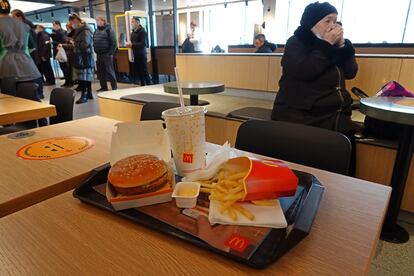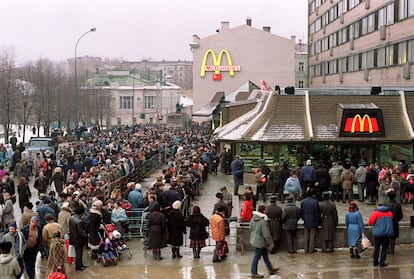Has Russia eaten its last Big Mac?
US multinationals are suspending activity in the country following the invasion of Ukraine, bringing the possibility of an end to three decades of openness to Western capitalism

In 1998, the year of the ruble crisis, former president of the Soviet Union Mikhail Gorbachev was involved in a controversial commercial for Pizza Hut. Two customers were seen arguing: a conservative Russian stuck in a sartorial time warp, and a well-dressed young liberal. “Because of him, we have economic confusion,” grumbled the older man, while his trendy opponent replied that Gorbachev had on the contrary brought “new opportunity” and “freedom” to the country. In the end, an elderly lady calmed them both down and everyone toasts the arrival of the American pizza chain.
Ten years earlier, Estée Lauder opened its first office in Moscow. In 1990, the first McDonald’s of the Soviet Union landed in front of Pushkin Square. Three decades of openness to the West may have come to an end on Wednesday with the last Big Mac served – for now at least – in the Russian capital.
The biggest American multinationals have suspended their activity in Russia, adding to the pall of economic uncertainty settling over the country. Coca-Cola, McDonald’s, Pepsi and others all promise to keep paying salaries in the short term, but they are waiting to see how much a ruble will be worth in the future, preferring to wait than to sell burgers and drinks at a loss.
Russia’s central bank has been trying to ease the ruble’s fall since the invasion began on February 24, but the final outlook is not yet clear. The Russian currency has gone from trading at 85 rubles to the euro before the war to around 125, halving in value. The same night that the US mega-chains announced their temporary closure, the regulatory body announced a “soft” freeze on foreign currency accounts.
McDonald’s opened its first restaurant on January 31, 1990. Hundreds of people crowded in front of the building that day, which at the time had a classic tile roof, unlike today’s cold avant-garde redesign. Only the golden arches give away now that it is not a museum or an office building.
“The Bolshoi [meaning “big” in Russian] Mac is something you’ve never tasted before,” said an employee 32 years ago, according to a report at the time by The Washington Post. This Wednesday hundreds of people crowded into the same place, the vast majority of them kids who never lived through the Russia of the 1990s. The chain now has 850 restaurants in the country.
Coca-Cola has long had a wild ride in Russia. The theft of its secret formula by the Soviet Union inspired Billy Wilder’s 1962 film One, Two, Three, and the first bottles arrived in the USSR in 1979 on the occasion of the Moscow Olympic Games. In another parallel with the boycott of Russian sport today, those Games were rejected by the West because of the invasion of Afghanistan. The US company announced that it will temporarily stop supplying its beverage to Russia, where it has no bottling plants.

The consequences of these suspensions are as yet unknown, and some in Russia are advocating nationalizing the companies. Parent company Yum! announced that it is temporarily closing the 70 Kentucky Fried Chicken (KFC) and 50 Pizza Hut restaurants it owns directly, although a thousand franchised KFCs will remain open. “Yum! will redirect all profits from its Russian operations to humanitarian aid. In addition, we remain as focused as ever on the safety of our people in the region and will act decisively to support our teams in Ukraine,” the company said in a statement. “This action builds on our decision to suspend all investment and restaurant development in Russia and redirect all profits from operations in Russia to humanitarian efforts,” Yum! continued. “As always, we remain focused on the safety of our people in the region and will continue to support our teams in Ukraine while evaluating the ways Yum! Brands can make a positive impact in the region.”
Farewell Levi’s
One of the biggest American icons for the Soviets was not restaurants, but pairs of Levi’s jeans. “Dzhinsy” were one of the most in-demand contraband products of the 1980s. Levi Strauss announced Monday that it was suspending sales in Russia, where it earned 2% of its turnover last year. “But any business considerations are clearly secondary to the human suffering experienced by so many. The LS&Co. community continues to be saddened by the devastating conflict in Ukraine and our thoughts are with all of those who have been affected, including our employees, partners and their loved ones,” the company said in a statement.
Cosmetics firm Estée Lauder may have been pioneering back in the day, with a price tag of $15 for lipstick when the average Russian salary hovered around $245 a month, but it too is now gone. “The Estée Lauder Companies continues to be devastated by the tragic invasion of Ukraine. We stand with all those that are suffering, including our employees and their families and the people of Ukraine,” it said in a statement. “After having already suspended The Estée Lauder Companies’ business investments and initiatives in Russia last week, we have also decided to suspend all commercial activity in Russia, including closing every store we own and operate, as well as our brand sites and shipments to any of our retailers in Russia.”
If these firms represented the opening of the 1990s, Ikea, which has also announced its closure, has been the symbol of Russia’s Westernization even under the watchful eye of Vladimir Putin. The globalization of Swedish furniture caused a furor in the country with the opening of its first store in 2000 on the outskirts of Moscow, and Russian houses have never looked the same again. Its stores – both its own outlets and those resulting from its alliance with the Mega supermarket chain – brought a new style as an emerging middle class began to grow in Putin’s first decade in power.
Tu suscripción se está usando en otro dispositivo
¿Quieres añadir otro usuario a tu suscripción?
Si continúas leyendo en este dispositivo, no se podrá leer en el otro.
FlechaTu suscripción se está usando en otro dispositivo y solo puedes acceder a EL PAÍS desde un dispositivo a la vez.
Si quieres compartir tu cuenta, cambia tu suscripción a la modalidad Premium, así podrás añadir otro usuario. Cada uno accederá con su propia cuenta de email, lo que os permitirá personalizar vuestra experiencia en EL PAÍS.
¿Tienes una suscripción de empresa? Accede aquí para contratar más cuentas.
En el caso de no saber quién está usando tu cuenta, te recomendamos cambiar tu contraseña aquí.
Si decides continuar compartiendo tu cuenta, este mensaje se mostrará en tu dispositivo y en el de la otra persona que está usando tu cuenta de forma indefinida, afectando a tu experiencia de lectura. Puedes consultar aquí los términos y condiciones de la suscripción digital.








































